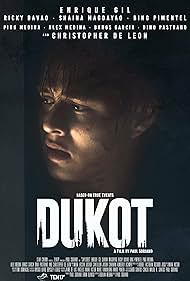When his son is kidnapped, a government official has to find the money to meet the ransom request.When his son is kidnapped, a government official has to find the money to meet the ransom request.When his son is kidnapped, a government official has to find the money to meet the ransom request.
- Awards
- 12 nominations
Photos
Rick Marvin Sanchez
- Danny
- (as Rick Sanchez)
Storyline
Did you know
- SoundtracksCerberus
Music by Klumcee (as Lester 'Klumsee' Vano)
Composed by Abra (as Raymond 'Abra' Abracosa), Loonie (as Marlon 'Loonie' Peroramas), Ron Henley
Performed by Abra Featuring Loonie and Ron Henley
Courtesy of Artifice Records
© 2013 Artifice Records
Used by permission
All Rights Reserved
Featured review
In a society where crime has inevitably become a way of life, director Paul Soriano (Kid Kulafu; Thelma) presents his latest film, Dukot, as a peephole into the traumas of abduction. The film delves into the psyches of both victims and perpetrators to show that evil persists in all social classes. Though Dukot can do more with dissecting its moral ambiguities, it makes it so at the expense of advocacy squandered.
Based on true events, Dukot centers on the kidnapping of Carlo (Enrique Gil), the son of a corrupt customs official, Charlie Sandoval (Ricky Davao). With both families of the captors and the captive in the throes of compromising their moralities, will the unforeseen tragedy cost Carlo's life?
The film's story, although typical, is a welcome addition to the local crime-thriller genre – with its excellent direction and cinematography. The aerial shots, obscure perspectives, and pulsating score effectively fill the air with dread and tension– Dukot is doubtless a technically well-crafted film.
Dukot is anchored by earnest portrayals from its cast. Enrique Gil wears a face glum with mental and emotional anguish. (At one point, he gets beaten up, and we guys get to relish that moment when we all look better than him. Ha!). Being silent for most of the film, his role demands more skill and nuance, which the young thesp ably delivers. Ricky Davao's two-faced character of both a model father and a corrupt government official may not be fully utilized by the plot, but he plays a huge part when it comes to reflecting the viewers' fright. Playing the role of Carlo's sister Cathy, Shaina Magdayao showcases the most range of emotions of guilt, fear and courage. Ping and Alex Medina's menacing delinquents ground the film on reality yet they keep from the pratfalls of becoming one-sided villains. Christopher De Leon strays away from his brash stereotype, and this time embodies a subdued sinister to his character.
This film heavily invests on the parallelism between the two contrasting households: the captors' and Carlos'. In one scene, Carlo witnesses a birthday party of one of his captor's family member, which makes him long the familial love he has been receiving but has taken for granted. The film also establishes a similarity in the characters played by Ricky Davao, Christopher De Leon and Ping Medina, despite their varying moral codes–that even a corrupt government official or a ruthless hostage can be steadfast fathers who will go beyond unimaginable lengths for their family's welfare. While Dukot raises interesting questions about what makes a good father and whether a good motive justifies a heinous act, it fails to offer any solid answer.
The subject of corruption is also put forward, even showing flashbacks of under-the-table transactions which are explicitly directed towards the "untouchable padrinos" in government. At that point, the film seems to concoct a connection between the abduction and the prevalent corruption, but this idea is completely dropped by the third act. Although a direct connection is not necessary for the film to make sense, the disappointing resolution falls short of delivering the social allegory it is trying to build. Moreover, some scenes proved irrelevant rather than beneficial. In one scene, Carlo sneaks in an official receipt which indicates his current location. In another, he tries to lure a deaf girl with paper planes to aid his escape. But none of those ruses really pay off. The movie opens with a grainy footage of an ATM attack, but it is never mentioned again. In the end, all of these half-baked elements, which were intended to add juice to the story, ends up feeling like afterthoughts that were squeezed in to elevate a thinly scoped plot.
Dukot can be commended on injecting fresh ideas into the local mainstream industry, and it shows Soriano's maturity in his craft. However, the script lacks the guts to deliver a story as dark and gritty as its visuals. Dukot holds back on depicting hostility and violence that could have rendered audiences more upset and unsettled about today's reality the moment they exit theaters.
http://www.filmpolicereviews.com/reviews/dukot
Based on true events, Dukot centers on the kidnapping of Carlo (Enrique Gil), the son of a corrupt customs official, Charlie Sandoval (Ricky Davao). With both families of the captors and the captive in the throes of compromising their moralities, will the unforeseen tragedy cost Carlo's life?
The film's story, although typical, is a welcome addition to the local crime-thriller genre – with its excellent direction and cinematography. The aerial shots, obscure perspectives, and pulsating score effectively fill the air with dread and tension– Dukot is doubtless a technically well-crafted film.
Dukot is anchored by earnest portrayals from its cast. Enrique Gil wears a face glum with mental and emotional anguish. (At one point, he gets beaten up, and we guys get to relish that moment when we all look better than him. Ha!). Being silent for most of the film, his role demands more skill and nuance, which the young thesp ably delivers. Ricky Davao's two-faced character of both a model father and a corrupt government official may not be fully utilized by the plot, but he plays a huge part when it comes to reflecting the viewers' fright. Playing the role of Carlo's sister Cathy, Shaina Magdayao showcases the most range of emotions of guilt, fear and courage. Ping and Alex Medina's menacing delinquents ground the film on reality yet they keep from the pratfalls of becoming one-sided villains. Christopher De Leon strays away from his brash stereotype, and this time embodies a subdued sinister to his character.
This film heavily invests on the parallelism between the two contrasting households: the captors' and Carlos'. In one scene, Carlo witnesses a birthday party of one of his captor's family member, which makes him long the familial love he has been receiving but has taken for granted. The film also establishes a similarity in the characters played by Ricky Davao, Christopher De Leon and Ping Medina, despite their varying moral codes–that even a corrupt government official or a ruthless hostage can be steadfast fathers who will go beyond unimaginable lengths for their family's welfare. While Dukot raises interesting questions about what makes a good father and whether a good motive justifies a heinous act, it fails to offer any solid answer.
The subject of corruption is also put forward, even showing flashbacks of under-the-table transactions which are explicitly directed towards the "untouchable padrinos" in government. At that point, the film seems to concoct a connection between the abduction and the prevalent corruption, but this idea is completely dropped by the third act. Although a direct connection is not necessary for the film to make sense, the disappointing resolution falls short of delivering the social allegory it is trying to build. Moreover, some scenes proved irrelevant rather than beneficial. In one scene, Carlo sneaks in an official receipt which indicates his current location. In another, he tries to lure a deaf girl with paper planes to aid his escape. But none of those ruses really pay off. The movie opens with a grainy footage of an ATM attack, but it is never mentioned again. In the end, all of these half-baked elements, which were intended to add juice to the story, ends up feeling like afterthoughts that were squeezed in to elevate a thinly scoped plot.
Dukot can be commended on injecting fresh ideas into the local mainstream industry, and it shows Soriano's maturity in his craft. However, the script lacks the guts to deliver a story as dark and gritty as its visuals. Dukot holds back on depicting hostility and violence that could have rendered audiences more upset and unsettled about today's reality the moment they exit theaters.
http://www.filmpolicereviews.com/reviews/dukot
- kevin_newdirections
- Jul 22, 2016
- Permalink
Details
Box office
- Gross US & Canada
- $75,199
- Runtime1 hour 35 minutes
- Color
Contribute to this page
Suggest an edit or add missing content


















